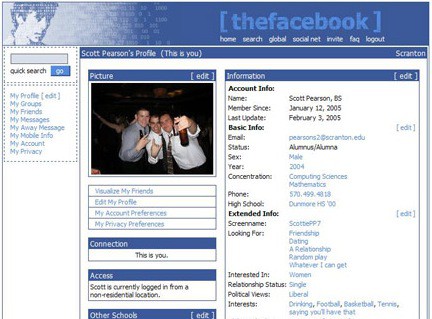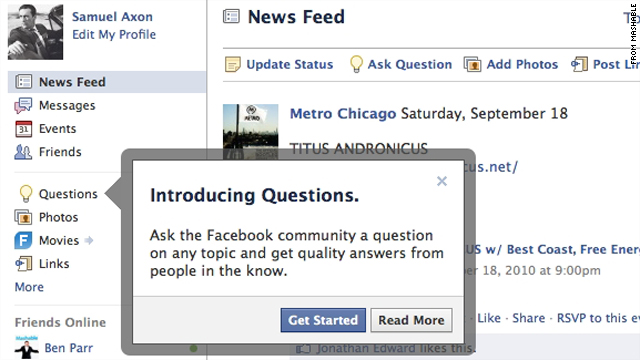Do you remember what Facebook used to look like? Did you know it's been 11 years since it first came out? It originally looked like this...
But as time went on, Facebook grew and constantly made changes as more
people recognized it as a social tool and an ongoing service. These constant
updates and new features created an engaging experience for the users even
though some of these changes were for testing purposes. This is otherwise known
as 'perpetual beta'. To create ongoing updates as the incomplete service
continues to develop.
What Facebook does is make their users feel like they are the first to
be a part of their newest features. One of the things they do is that they do
not ask you to update anything upon any of their changes. This may feel like a
small component but it makes the users feel as if it’s the real deal for the
site. Upon adding new features, Facebook also provides instructions and tips to
better understand the changes. On top of that, Facebook is able to monitor who
and how many people uses these features. This allows developers to better
understand how impactful a feature is.
They also do not make drastic changes they don’t want to overwhelm their
users. So they slowly brought out features like Facebook messenger and video.
From this, they were able to monitor the feedback or conversations on the given
feature. All they need to do is track keywords in conversations and get a
general idea of what people may think about it. Sure this may be breaking some
privacy laws, but Facebook can gain much needed information to better
understand their own product.
On a programming side, Facebook uses PHP to boost compiling performance, Linux
since it is open source and to boost network throughput, MySQL logic storage on
web servers and many more. The more tools that can be used with Facebook, the
faster updates and new developments can be released for feedback. This is
really appealing since Facebook is so heavily used, it opens up and allows a
number of different languages to be applied.
When you compare Facebook to a site like Myspace, they both continued to
grow and continually introduced new features to keep up with their user base.
However, Myspace failed to listen to their users and according to certain
posts, politics and new management
ruined Myspace's reputation. Facebook soon became the norm of social
tools.
Thanks for reading my post! Let me know what feature you really liked about Facebook which they later removed or visa versa.



Good points. You clearly explained that there is no 'finished' product and in most respects that is a good thing. Without constant improvement what would keep a user continually going back? What about the trend at the moment where almost everything is starting out in open beta? Having the users become the testers? It could save money for the company and allow for a lot more ideas but at the same time does it feel like there is less of an effort to complete the product?
ReplyDeleteGood post Winston. Facebook is a great example of perpetual Beta, as its gone through a plethora of changes from its inception and I'm certain that there are plenty more to come. I always find it funny how much people complain when facebook implements noticable changes to its interface. It seems that for a week or so everyone complains about it, but once they get used to it they seem to end up preferring it to the older versions. On that note, do you think that products that are in perpetual beta run the risk of changing too much? Changes may be implemented for the sake of it, which may take away from what the product originally intends to achieve. What are your thoughts?
ReplyDelete